WHO AM I?
My parents never spoke of what had happened to them in WWII. Shikata ga nai. It can't be helped. They bore the shame and put the past behind them. Because of the silence, I grew up feeling that it was a bad thing to be Japanese Canadian. More than anything, I wanted to be white and I hated being Japanese. It took me my entire life to forgive the past and love who I am.
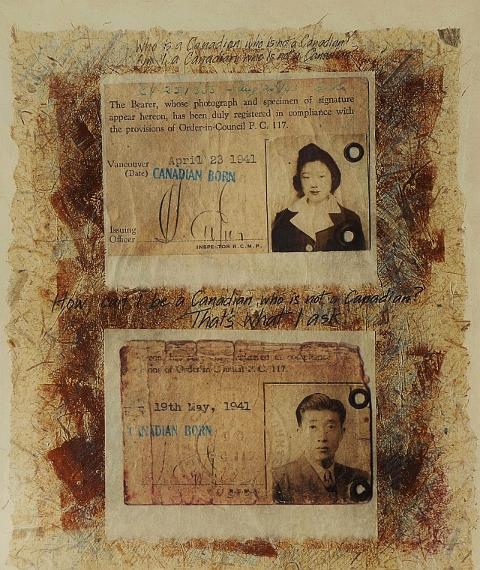
How Can I Be a Canadian Who Is Not a Canadian? Mixed Media 24"x 22"
How Can I Be a Canadian Who Is Not a Canadian?
All Japanese Canadians had to be fingerprinted and carry identification cards at all times. They had to produce it if anyone asked to see it. They felt like criminals. Here, we see my parents' ID cards.
"Who is a Canadian who is not a Canadian? I ask Is a Canadian who is not a Canadian, a Canadian? I ask."
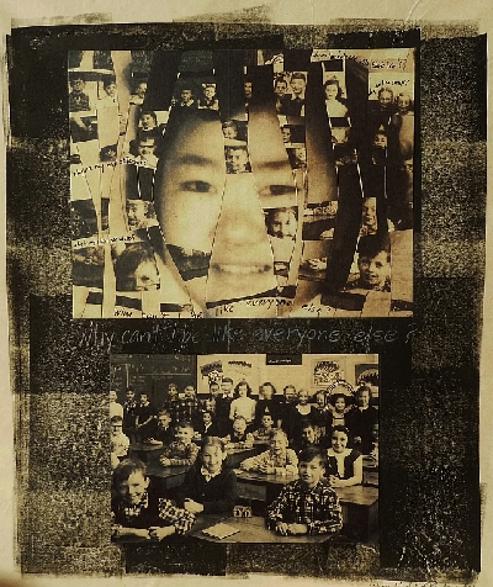
Why Can't I Be Like Everyone Else? Mixed Media 24"x 22"
Why Can't I Be Like Everyone Else?
When I first went to school in Ontario, there were no Asian or Black children in the whole school. The children were all very kind to me and accepted me as one of them. But I felt different, an outsider. I wanted to look like mainstream Anglo children. I was ashamed of being Japanese. I decided, at age six, to stop speaking Japanese, my first language, at home. It must have hurt my parents very much.
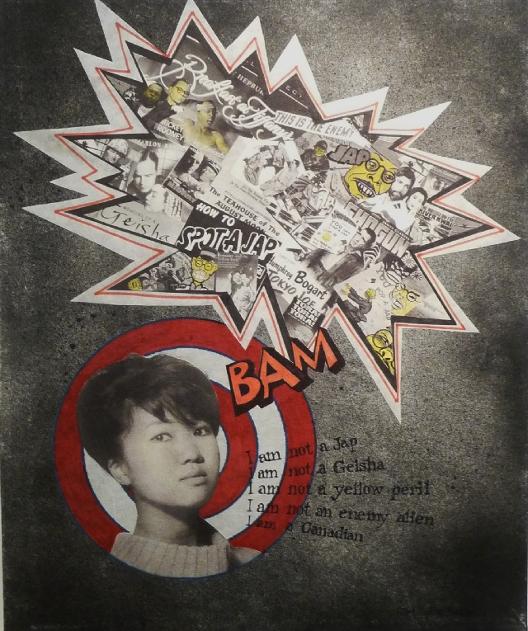
Target Mixed Media 24"x 22"
Target
I grew up with war movies – anti German, anti Japanese. There were a huge number of war films in the 1950s and 1960s. I always felt that the Japanese were ‘them” not us. In my teens, the boys wanted to see if I were like the Geishas in the movies. On the one hand, I was flattered that white boys wanted to go out with me. On the other hand, I hated being seen as exotic. Here, I feel targeted by any references to Japanese. As a result, I became very shy, quiet and easily embarrassed. I grew up denying my own culture.
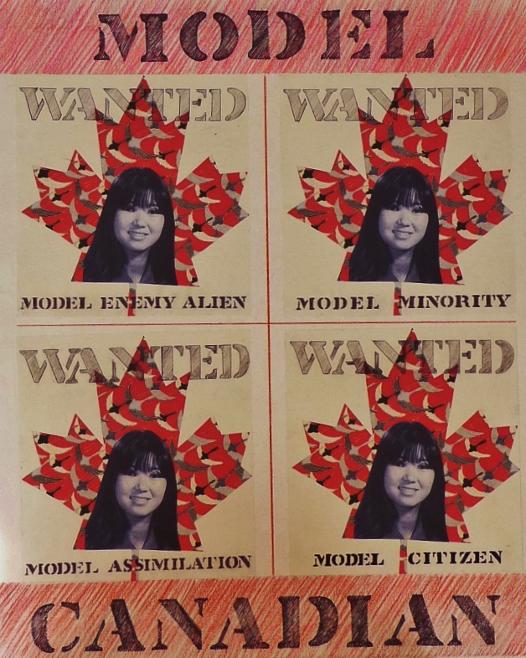
Wanted: Model Canadian Mixed Media 24"x22"
Wanted: Model Canadian
The Japanese are a “shame” culture. Everything an individual does reflects on the whole community. Because of the forced relocation of Japanese Canadians during WWII, they felt that if they behaved as perfect Canadians, they would once again be accepted as members of Canadian society.
I am a Sansei, a third generation Japanese Canadian. Still, I always felt that I had to earn my citizenship. My father wanted me to be perfect in every way, especially at school. I became obsessed with being the best. This work is reminiscent of a wanted poster. Wanted: Model enemy alien – Not a single act of rebellion during WWII by Japanese Canadians Wanted: Model Minority – See no evil, hear no evil, speak no evil Wanted: Model Assimilation – No visible Japanese Canadian community, loss of culture/identity Wanted: Model Citizen – All Japanese Canadians are law-abiding.
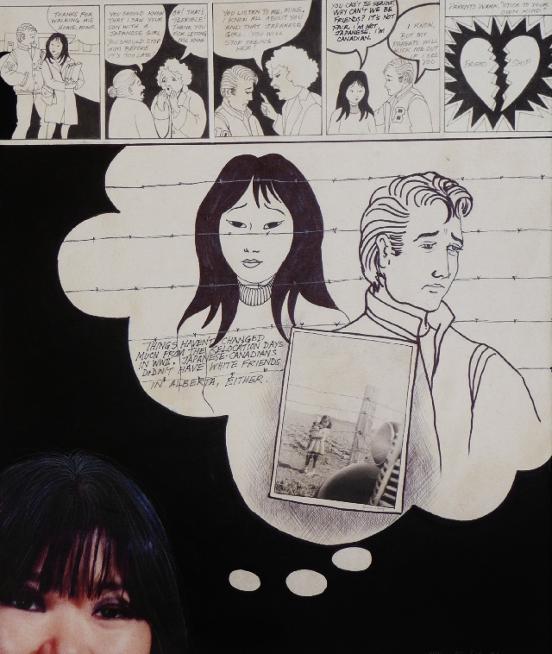
You Can't Be Serious! Mixed Media 24"x 22"
You Can’t Be Serious!
Mixed romantic relationships create problems for young people of all immigrant families. The marginalization of my family made me determined to belong to mainsteam Canadian culture, not to Japanese culture.
In high school, I was very good friends with a Ukrainian Canadian boy who usedto walk me home. I was very hurt and shocked when his parents threatened to throw him out if he continued to be friends with me. We had done nothing wrong. He was just a good friend. “You Can’t be Serious” is both literal and figurative. It is a warning that young mixed race teenagers are not supposed to be serous about each other. It also expresses my disbelief that you should not be friends with anyone outside your own culture.
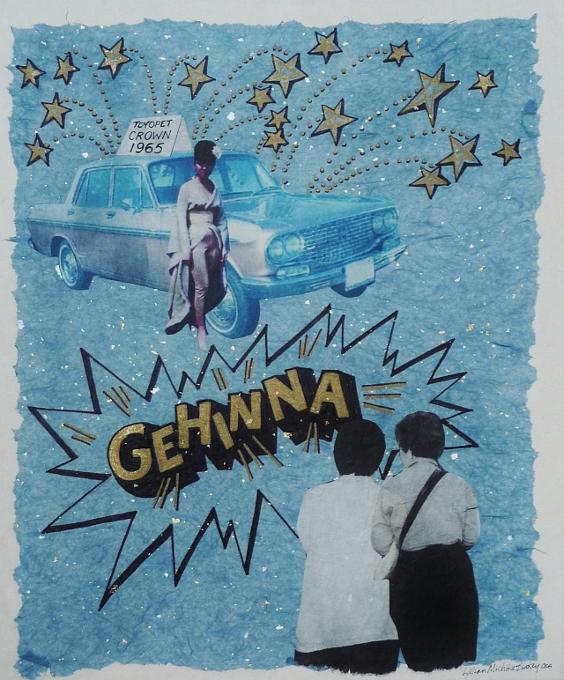
Gehinna / Vulgar Mixed Media 24"x 22"
Gehin na (Vulgar)
At the CNE in Toronto, 1965, Toyota Motors made its Canadian debut. It was the first Japanese export of quality to North America, following postwar cheap breakable toys and trinkets. Toyota hired Eleanor Fulcher Modelling Agency to find models. I was chosen to be one of the four models.
Before this, I had distanced myself from anything Japanese, but my ego won out and I represented Toyota at the CNE. I overheard two elderly Japanese women say, “Gehin na”. I could not speak Japanese but I understood the derogatory comment. I was ashamed. The women were disgusted by the pseudo Kimono I was wearing – tight lame gold pants with a peau de soie kimono opening in the front, spiked high heel gold shoes. Even worse, I represented a Japanese company. Japanese Canadians did not buy Toyota cars for years as they did not want to be associated with Japanese products. To this day, I am embarrassed as I remember the shame.
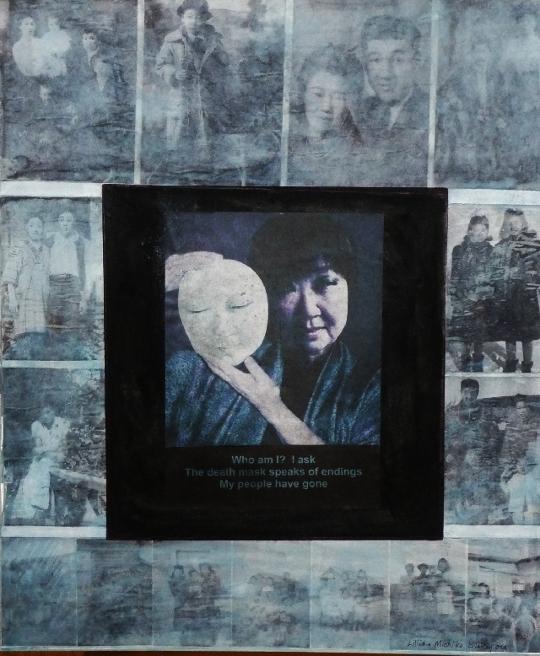
The Death Mask Speaks of Endings Mixed Media 24"x 22"
The Death Mask Speaks of Endings
HAIKU
Who am I?
I ask
Death Mask speaks of endings
My people have gone
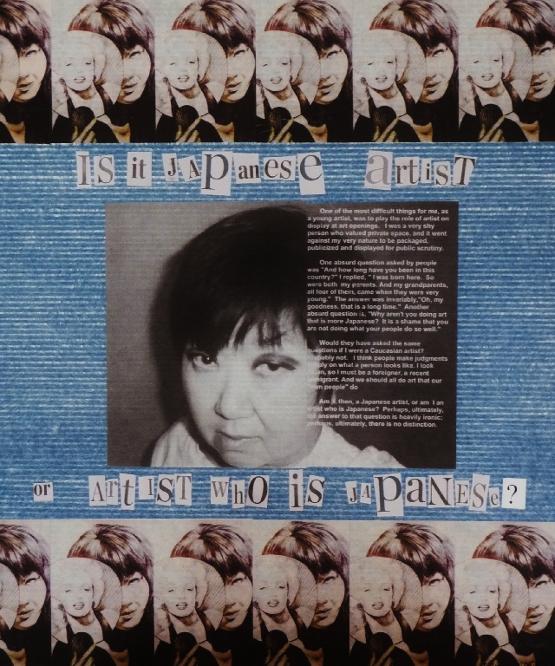
Is it Japanese Artist or Artist Who is Japanese? Mixed Media 24"x 22"
Is it Japanese Artist or Artist Who is Japanese?
One of the most difficult things for me, as a young artist, was to play the role of an artist on display at art openings. I was a very shy person who valued private space.
One absurd question asked by people was, "How long have you been in this country?" I replied, "I was born here. So were both my parents. And my grandparents, all four of them, came here when they were very young." The answer was invariably "Oh my, that is a long time. "
Another absurd question was, "Why aren't you doing art that is more Japanese? It's a shame that you're not doing what your people do so well." Would they have asked the same questions if I were a Caucasian Artist? I think people make judgments on what a person looks like. I look Asian, so I must be a foreigner, a recent immigrant. And we should all do art that "our own people" do.
Am I, then, a Japanese artist, or am I an artist who is Japanese? Perhaps ultimately, the answer to that question is heavily ironic; perhaps, ultimately, there is no distinction.
Ancestors' Ashes Mixed Media 24"x 22"
Ancestors' Ashes
All of my ancestors came from a culture thousands of years old. Because of our shame of war with Japan, my generation, the Sansei, the third generation, distanced ourselves from anything Japanese to become more Canadian. As a result, most Sansei chose to marry outside the culture. We lost our heritage, our traditions, our language. The fourth and fifth generations have almost no trace of being Japanese. As I grow older, I regret this loss for my grandchildren.